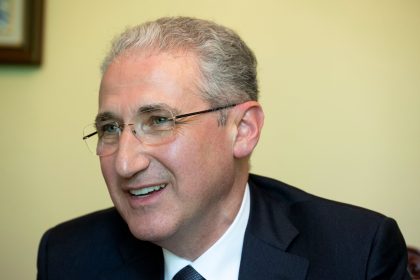Senators Urge Protecting Infrastructure From Ravages of Climate Change

WASHINGTON — Outside the Senate Budget Committee offices Wednesday, temperatures edged toward the century mark during what meteorologists say is the world’s hottest month in recorded history.
Inside, senators juggled ideas during a hearing on how to handle the damage climate change is doing to the nation’s infrastructure.
Sen. Sheldon Whitehouse, D-R.I., the committee’s chairman, warned that “dawdling” on a response imperiled the entire economy.
“Those dangers are clear and present,” he said.
High heat is making roadways, runways and railways buckle; causing power outages; overrunning coastlines with rising sea levels; and stretching health care resources as sunstroke and heat-related heart attacks claim more victims.
None of the senators or expert witnesses doubted climate change could be devastating. They disagreed only on the best methods for confronting it.
Whitehouse said the U.S. government must invest in alternative energy, such as electric vehicles and wind energy, to “zero out emissions by 2050.”
Sen. Charles Grassley, R-Iowa, cautioned against rushing into enormous and ill-advised investments while the U.S. government already is $32 trillion in debt.
He mentioned as an example President Joe Biden’s goal of compelling automakers to make 50% of their new vehicles run on rechargeable battery power by 2030.
“Most people believe these goals are impossible to meet,” Grassley said.
One more practical alternative might be to streamline the permitting process for new electrical generating plants and transmission lines, thereby reducing the strain on the nation’s energy grid, he and witnesses from the energy industry said.
A leading bipartisan climate change effort is the RISEE Act, S.373, pending in the Senate. RISEE stands for Reinvesting in America’s Shoreline Economies and Ecosystems.
The bill would increase revenue returned to states from offshore wind projects, offshore oil and gas leases, onshore energy and mineral resources. States would be required to use the revenue for projects to reduce the effects of climate change, such as coastal restoration, conservation or infrastructure improvement.
Currently, most of the revenue from offshore wind projects goes to the federal government.
Louisiana Gov. John Bel Edwards, a Democrat, said his state is suffering more severely than any other from climate change. He mentioned the greater rate of hurricanes, coastal flooding and rising temperatures as examples.
He advocated proactive measures to prevent the damage rather than waiting to rebuild after disasters.
Louisiana is spending $1.6 billion this year and spent $1.3 billion last year to protect the state’s coasts. The state is building levees and artificial islands, installing systems to protect drinking water from contamination by floodwaters and appropriating money to raise the foundations of buildings above potential flood levels.
“Our experience proves that such investments do in fact pay off,” Edwards said.
Inaction would be more expensive, likely spreading far beyond Louisiana, he said.
“Things that happen in one part of the country have a cascading effect in other parts of the country,” Edwards said.
Jesse M. Keenan, an associate professor of sustainable real estate at Tulane University in New Orleans, Louisiana, said some infrastructure projects fail to consider the long-range effects of climate change.
Heat damage will increase road maintenance costs by $19 billion a year by the end of this decade, he said.
Planners must ask, “Are we designing today’s infrastructure to handle tomorrow’s load and tomorrow’s climate demands,” Keenan said.
Without adequate planning and preservation, “It will undermine our global economic competitiveness,” he said.
You can reach us at [email protected] and follow us on Facebook and Twitter

























